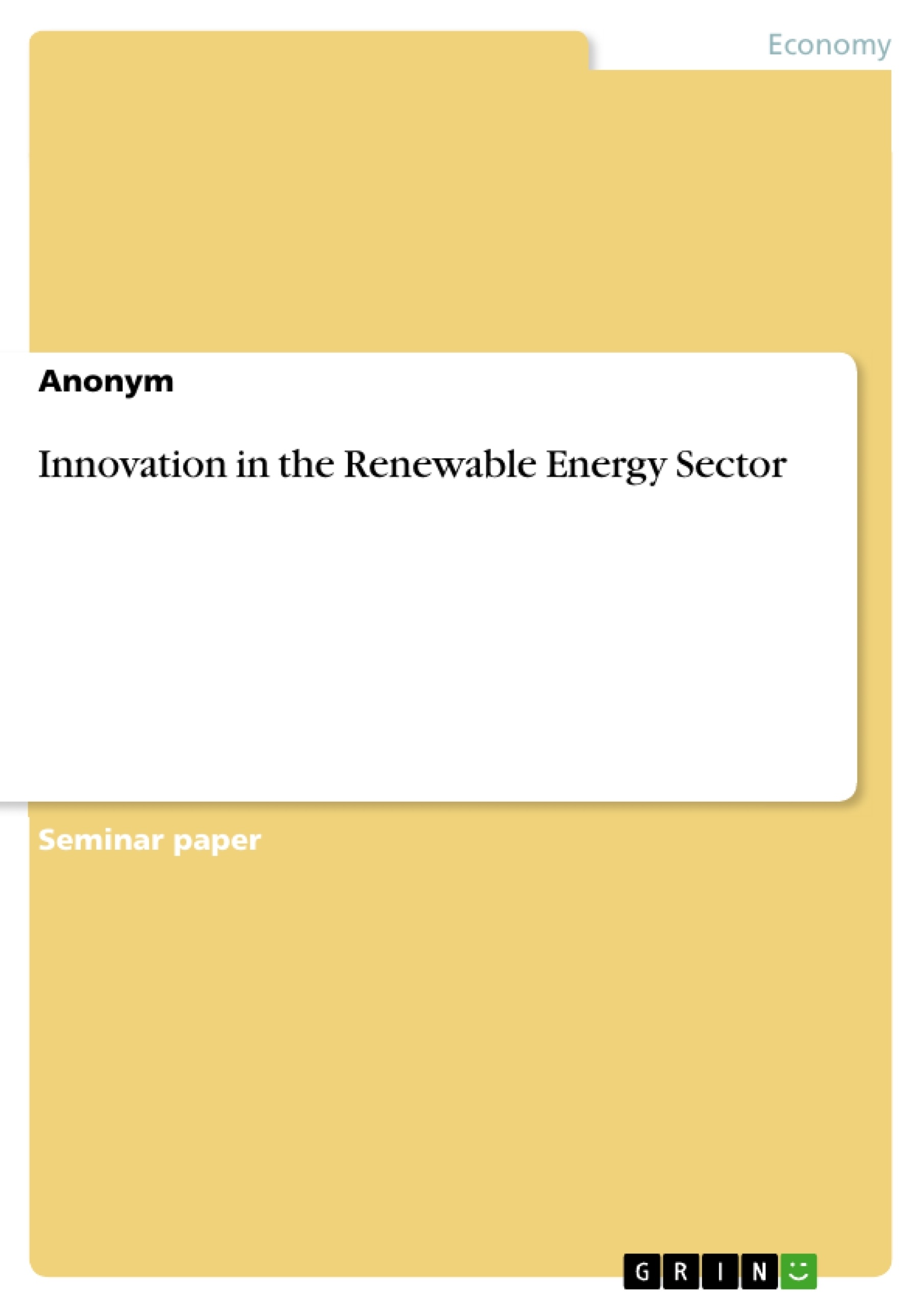This paper aims to analyze the innovations in the renewable energy sector. First of all, it provides some background information about the recent environmental issues. Secondly, it analyzes different governmental decisions in the innovation sector with the goal to fight global warming. The main aim of this paper focuses on the innovation development within the renewable energy industry. It also further researches product and process innovation, the governmental financing decisions on renewable energy projects and the resulting benefits.
Inhaltsverzeichnis (Table of Contents)
- Summary
- Environmental Issues
- Governmental Decisions in the Innovation Sector
- Innovation Development within the Renewable Energy Industry
- Product and Process Innovation
- Governmental Financing Decisions on Renewable Energy Projects
- Benefits of Renewable Energy
- Renewable Energy Sources
- Contribution of Renewable Energy Sources
- European Union and Renewable Energies
- EU Emissions Trading Scheme (EU ETS)
- Innovation-Oriented Environmental Policies
- Empirical Evidence of Environmental Policies and Innovation
Zielsetzung und Themenschwerpunkte (Objectives and Key Themes)
This paper analyzes innovations in the renewable energy sector. It explores the environmental issues driving this innovation, examines government decisions and financing mechanisms in the sector, and investigates the development of product and process innovations within the renewable energy industry.- Environmental Impacts of Climate Change
- Governmental Policies and Regulations for Renewable Energy
- Innovation and Development in the Renewable Energy Industry
- The Role of Public Policies and Incentives
- The Impact of Renewable Energy on Energy Markets
Zusammenfassung der Kapitel (Chapter Summaries)
- The paper begins by discussing the pressing environmental issues caused by climate change. It highlights the dangers of rising sea levels, melting glaciers, and extreme weather events, emphasizing the disproportionate impact on developing countries.
- Next, the paper examines governmental decisions and policies aimed at promoting innovation in the renewable energy sector. It focuses on the Copenhagen accord, which sets a temperature rise limit, and the increasing role of emerging countries like China and India in climate change discussions.
- The paper delves into the development of innovations within the renewable energy industry. It explores different types of renewable energy sources, including wind, solar, geothermal, ocean, biomass, and waste material energy power.
- The paper analyzes the role of public policies in supporting renewable energy development. It discusses the use of subsidies, tax breaks, and tradable energy certificates to reduce innovation costs and stimulate market implementation. It also categorizes renewable energy technologies into three generations: first, second, and third-generation technologies.
- The paper examines the contribution of renewable energy sources to the global energy supply. It highlights the growing trend towards eco-friendly energy sources, with renewable energy accounting for a significant portion of total energy supply.
- The paper discusses the European Union's commitment to renewable energy and its efforts to reduce greenhouse gas emissions. It describes the EU Emissions Trading Scheme (EU ETS), which aims to cut emissions cost-effectively by allowing businesses to trade carbon dioxide emissions.
- The paper analyzes the impact of environmental policies on innovation, using patent activity as an indicator. It cites studies that found a strong correlation between environmental policy stringency and an increase in environmental patents, suggesting that environmental policies can stimulate innovation.
Schlüsselwörter (Keywords)
The keywords of this paper include renewable energy, climate change, innovation, environmental policies, government regulations, subsidies, patents, energy markets, and the role of emerging countries in the global energy landscape. These terms represent the primary focuses of the paper, encompassing the challenges and opportunities presented by the transition towards a more sustainable energy future.Frequently Asked Questions
What are the main drivers for innovation in renewable energy?
The primary drivers are pressing environmental issues like global warming, rising sea levels, and the need for sustainable alternatives to fossil fuels, alongside international agreements like the Copenhagen Accord.
How do governments support renewable energy projects?
Governments use various financing mechanisms, including subsidies, tax breaks, and tradable energy certificates, to reduce innovation costs and stimulate market implementation of green technologies.
What is the EU Emissions Trading Scheme (EU ETS)?
The EU ETS is a "cap and trade" system that allows businesses to trade carbon dioxide emission allowances, aiming to reduce greenhouse gas emissions in a cost-effective manner.
What is the difference between product and process innovation in energy?
Product innovation focuses on developing new energy sources (like improved solar panels), while process innovation involves improving the efficiency and methods of energy production and distribution.
How is patent activity related to environmental policy?
Empirical evidence suggests a strong correlation: as environmental policies become more stringent, the number of environmental patents typically increases, indicating that regulation stimulates innovation.
Which renewable energy sources are currently most significant?
Significant sources include wind, solar (photovoltaic), geothermal, biomass, and ocean energy, each categorized into different technology generations based on their market maturity.
- Arbeit zitieren
- Anonym (Autor:in), 2011, Innovation in the Renewable Energy Sector, München, GRIN Verlag, https://www.grin.com/document/287776



